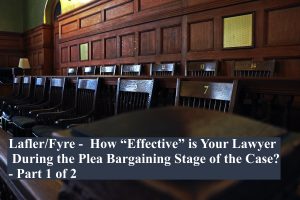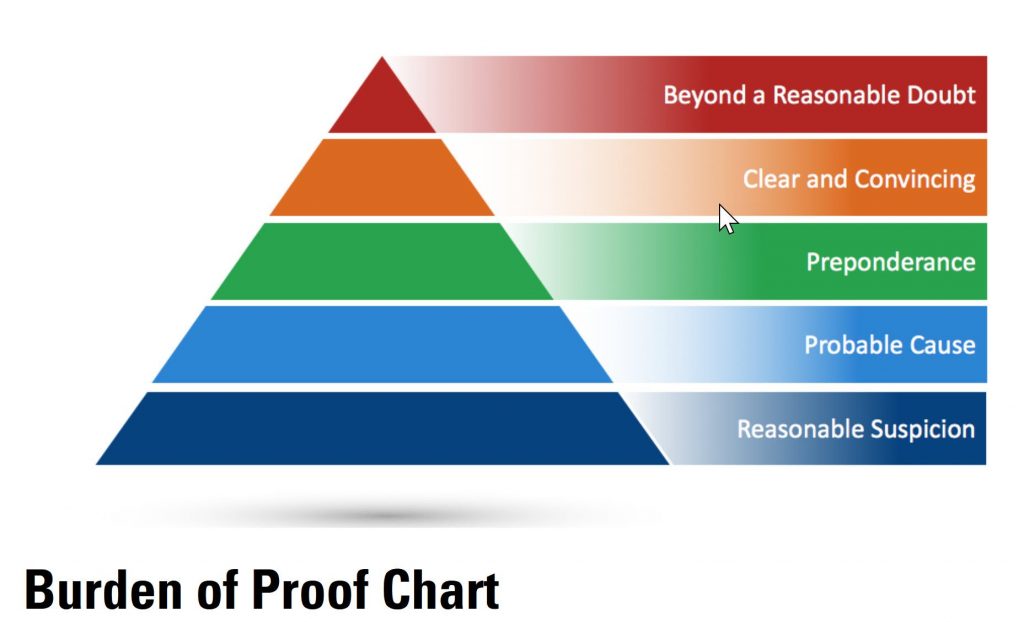Lafler/Fyre – How “Effective” is Your Lawyer During the Plea Bargaining Stage – Part 1 of 2

By H. Michael Steinberg Colorado Criminal Defense Lawyer
Introduction – A System of Negotiations, and Very Few Trials
Black’s Law Dictionary defines a “plea bargain” as:
[a] negotiated agreement between a prosecutor and a criminal defendant whereby the defendant pleads guilty to a lesser offense or to one of multiple charges in exchange for some concession by the prosecutor, usually a more lenient sentence or a dismissal of the other charges.
It is a well-accepted reality that approximately ninety-five percent of criminal convictions, both state the state of Colorado and in the Federal criminal justice system, end in guilty pleas, and not in trials. While I have written about the importance of the skilled experience of a criminal defense lawyer in plea negotiations, this area of the law bears even closer scrutiny.
The Supreme Court has recognized that:
“plea bargaining is not an adjunct to the criminal justice system; it is the criminal justice system.”
The “effective assistance of counsel” guaranteed by the Sixth Amendment takes on a very different meaning in the context of plea bargaining. A criminal defense lawyer’s worth to the accused extends well beyond the popular image of the criminal defense lawyer persuading the jury in a courtroom during a trial to find reasonable doubt in the State’s case.
The reality today, well known to all criminal defense lawyers and those who practice daily in the criminal courts of Colorado, is that the ability of a criminal defense lawyer to reach the best result in a criminal justice system must include BOTH exceptional skills at trial AND also negotiating a fair and just plea bargain.
The Evolution of “Plea Bargaining Law”
This emerging new area of jurisprudence has been called – “plea bargaining law.” – It may seem an area of law that addresses the process of plea bargaining is at first difficult to grasp and may even seem counterintuitive to some, but the rules regarding plea bargain negotiations, once primarily the domain of the backrooms and hallways of the courthouse, has been quietly evolving very rapidly over the last decade or so.
The relatively recent United States Supreme Court decisions in Lafler v. Cooper and Missouri v. Frye (2012) (discussed more fully below) exposed the realtiy of the method and the manner in which most criminal cases are actually resolved – a negotiated plea agreement.
The Sixth Amendment’s Mandate – the Effective Assistance of Counsel
“In all criminal prosecutions, the accused shall enjoy the right to … the Assistance of Counsel for his defence.”
U.S. Constitution Amend. VI.
“The Sixth Amendment, applicable to the States by the terms of the Fourteenth Amendment, provides that the accused shall have the assistance of counsel in all criminal prosecutions. The right to counsel is the right to effective assistance of counsel.”
Strickland v. Washington, 466 U.S. 668, 686, 104 S.Ct. 2052, 80 L.Ed.2d 674 (1984).
Colorado’s criminal defense lawyers have a constitutional mandate and ethical responsibility to provide effective representation at every critical stage of a criminal case... from early intervention during the investigation and charging decision phase of a case (if that is possible when retained), to persuasive arguments for the least punitive sanction at the sentencing/judgment stage.
At the plea bargaining stage of a case, following the investigation and charging decisions, but before a matter goes to trial, Colorado’s criminal defense lawyers are required, through a set of evolving guidelines, to properly advise their clients of their plea bargaining options.
If a criminal defense lawyer’s advice during the plea bargaining stage falls below minimum standards of competency that advice result in devastating consequences to the accused and an appeal may lie under Colorado Rule of Criminal Procedure Rule 35(c).
The Duty to Provide Effective Representation at the Plea Bargaining Stage of a Criminal Case
The Lafler case (Lafler v. Cooper) has led to a claim on appeal that is now routinely called a “Lafler claim.”
A Lafler claim essentially alleges ineffective assistance of counsel during plea negotiations. The clear impact of the Lafler-Frye line of cases has been to affirm that Defendants have a right to effective representation, not only at trial but during the plea bargaining stage which includes, at the most basic level, a duty to timely and effectively communicate all plea offers made by the prosecution.
More broadly, a “Lafler claim” means the Defendant alleges that his or her attorney has failed to provide adequate representation concerning a plea offer by the prosecution.
One Court, the United States Court of Appeals for the First Circuit, described a Defendant’s Lafler Claim as follows:
The Lafler Claim (follow link to the case)
Rivera-Ruperto reprises a Lafler challenge that he made (and lost) in his first appeal, in which he argues that he received ineffective assistance of counsel during the plea-bargaining phase.
See Lafler v. Cooper, 132 S. Ct. 1376, 1384 (2012) (holding that a defendant’s Sixth Amendment right to competent counsel extends to the plea-bargaining process).
The Opening Salvo – the Lafler “Record” – Publicly Stating the Plea Offer
The process of challenging the competency of a defense lawyer’s advice in a criminal case often starts with the open record sometimes called a “Lafler record.”
The Lafler/Frye line of cases, clearly requires that a criminal defense lawyer must not only present all plea offers to their clients, but the duty of the lawyer is also to provide an effective opinion to that client on whether that plea offer should be accepted or rejected.
The rub?
What is an effective opinion?
What should be included in that opinion? and
Precisely how (see Part 2 of this article) should that opinion be conveyed to the Defendant?
“Lafler records” are being made all across the criminal courts of this country that suggest, at least to the State’s prosecutor, that effective advice is not being conveyed. To make a Lafler record, the prosecutor orally places his or her plea bargain offer to settle a criminal case “on the record” and in open court.
A Lafler record is a kind of “warning shot” across the bow of the criminal defense lawyer’s ship. It means this – “I think this is a good offer – criminal defense lawyer do your job.”
The purpose of the “Lafler record” is to essentially “bypass” the confidential communications between the criminal defense lawyer and their clients to make a Defendant directly aware of the State’s plea bargain offer. Often along with the offer, there is an expiration date for that offer. If the offer is not accepted within the time allotted the case will proceed to trial with no plea bargain.
The Lafler “record” usually sounds something like this:
For the record, the offer in this case is _______________________________________.
After [the deadline] the offer will be revoked.
The maximum exposure for the Defendant for this charge if convicted is ______________________________….
An experienced and qualified lawyer will not be phased by a Lafler record but for the unprepared, inexperienced, and uninitiated lawyer it can be an intimidating moment.
As noted, at a minimum, criminal defense lawyers must convey ALL plea bargain offers to their clients. But their responsibility to the client is much greater than the mere communication of an offer to settle.
The duty of a criminal defense lawyer, before offering advice on a plea offer, is to thoroughly investigate the strengths and weaknesses of a criminal case and to advise the client on every facet of the decision made at every stage of the case, and that includes plea bargaining negotiations.
Before advice can be offered by the criminal defense lawyer in ANY case, some basic questions must be asked:
What are the strengths and weaknesses of the prosecution’s case?
What is the defense theory of the case, what are the merits of that theory, and what is the likelihood of success at trial?
What are the possible consequences of a conviction – the range of possible sentences?
The ABA Standards for Criminal Justice Pleas of Guilty provide written guidance regarding the responsibilities of defense counsel in this area:
Standard 14-3.2(b) states that:
“[d]efense counsel should not recommend to a defendant acceptance of a plea unless appropriate investigation and study of the case has been completed.”
Standard 4-4.1(a) provides:
Defense counsel should conduct a prompt investigation of the circumstances of the case and explore all avenues leading to facts relevant to the merits of the case and the penalty in the event of a conviction.
The investigation should include efforts to secure information in the possession of the prosecution and law enforcement authorities.
The duty to investigate exists regardless of the accused’s admissions or statements to defense counsel of facts constituting guilt or the accused’s stated desire to plead guilty.
When the Criminal Defense Lawyer’s Performance Falls Below Minimum Competency: The Strictland Tests
While the Constitution does not grant the Defendant a right to receive a plea offer or a right to compel a judge to accept the plea bargain, it does (through the Sixth Amendment), guarantee the right to the effective assistance of counsel at all phases of a criminal case – including the plea bargaining phase.
The vehicle for making an “ineffective assistance of counsel” claim is most commonly a Motion for Post-Conviction Relief under Colorado Rule of Criminal Procedure – Rule 35(c).
To prevail on a “35(c) claim in this context a Defendant must establish that:
(1) Their counsel’s performance fell below the level of reasonably competent assistance demanded of attorneys in criminal cases,
and
(2) the deficient performance prejudiced the Defendant.
Strickland v. Washington, 466 U.S. 668, 687 (1984);
The so called “prejudice prong” of the Strictland tests – (prong (2)) requires a Defendant to “show that there is a reasonable probability that, but for counsel’s errors, he or she would not have pleaded guilty and would have insisted on going to trial.”
“Reasonable probability” means a probability sufficient to undermine confidence in the outcome and is a standard “somewhat lower” than a preponderance of the evidence.
This is an objective test: and requires that a Defendant prove, not whether the Defendant likely would have been acquitted at trial, but whether their lawyer’s conduct affected the outcome of the plea process.
This is a difficult burden. The objective evidence required must corroborate the Defendant’s testimony that he or she would have made a different decision about the plea if he had been “properly advised.”
The Court, in a Rule 35(c) proceeding on these grounds, must be convinced that the decision to reject the plea bargain would have been rational under the circumstances.
A key component of the proof usually turns on the strength of the prosecution’s case. To answer this question, the plea bargain offer, as compared to the risks of going to trial, is thoroughly analyzed.
SideBar: When the Plea Offer “Expires”
Ineffective assistance of counsel claims are not limited to the most common rejection of a plea bargain. A claim may lie where the Defense attorney causes or somehow negligently lets a plea offer to lapse. When this occurs, the Defendants must again show a reasonable probability that:
(1) The offer would have been presented to the Court – the Defendant would have accepted that offer and the prosecution would not have withdrawn it due to intervening circumstances,
(2) The Court would have accepted the terms of the agreement, and
(3) The conviction or sentence, or both, under the offer would have been less severe than under the judgment actually imposed.
Summary: Misjudgment is NOT Ineffective Assistance of Counsel
Without question, a criminal defense lawyer plays a critical role in plea negotiations. The right to effective representation includes the right to effective plea bargaining counsel and is judged – as all ineffective assistance claims are judged – by the defense lawyers’ success or failure in following prevailing professional norms.
The attorney’s performance must be “`within the range of competence demanded of attorneys in criminal cases.'” That range of competence is exceptionally broad.
Competence is not a “second-guessing” – game of 20:20 hindsight. A claim of ineffective assistance of counsel must overcome a strong presumption that counsel’s conduct falls within the wide range of reasonable professional assistance.
Furthermore, even if it is established that the attorney’s performance was deficient, the deficiency must have prejudiced the defendant by creating a “reasonable probability that, but for counsel’s unprofessional errors, the result of the proceeding would have been different.”
While that may sound like an easy standard to meet, it is actually a very high bar.
The question under consideration in a claim of ineffective assistance of counsel during the plea bargaining phase of a criminal case is not whether a Judge would, in retrospect,vconsider counsel’s advice to be right or wrong, but whether the advice to the Defendant was within the range of competence demanded of attorneys in criminal cases.
A plea bargain will almost never be overturned merely because a Defendant pleaded guilty or was later convicted after rejecting a plea bargain, based solely on Defense Counsel’s inaccurate prediction of the end result in a case. The issue is whether the lawyer’s advice and the prediction was “constitutionally reasonable.”
End of Part 1 – See Lafler/Fyre – How “Effective” is Your Lawyer During the Plea Bargaining
“A person charged with a crime requires the guiding hand of counsel at every step in the proceedings against him. Without it, though he be not guilty, he faces the danger of conviction because he does not know how to establish his innocence.”
United States Supreme Court – Powell v. Alabama, 287 U.S. 45, 69 (1932)
If you found any information I have provided on this web page article helpful please share it with others over social media so they may also find it. Thank you.
Never stop fighting – never stop believing in yourself and your right to due process of law.
 ABOUT THE AUTHOR: H. Michael Steinberg – Email The Author at hmsteinberg@hotmail.com – A Denver Colorado Criminal Defense Lawyer – or call his office at 303-627-7777 during business hours – or call his cell if you cannot wait and need his immediate assistance – 720-220-227. Attorney H. Michael Steinberg is passionate about criminal defense. His extensive knowledge of Colorado Criminal Law and his 42 plus years of experience in the courtrooms of Colorado may give him the edge you need to properly defend your case.
ABOUT THE AUTHOR: H. Michael Steinberg – Email The Author at hmsteinberg@hotmail.com – A Denver Colorado Criminal Defense Lawyer – or call his office at 303-627-7777 during business hours – or call his cell if you cannot wait and need his immediate assistance – 720-220-227. Attorney H. Michael Steinberg is passionate about criminal defense. His extensive knowledge of Colorado Criminal Law and his 42 plus years of experience in the courtrooms of Colorado may give him the edge you need to properly defend your case.
As a former career prosecutor for Arapahoe and Douglas Counties, he has a unique understanding of the criminal justice system that works to his clients’ advantage to better protect their rights. H. Michael also knows how to talk clearly and very directly to his clients, his adversaries, and to the Court. He uses his life experience, common sense, and straight talk to help clients fully understand and make decisions regarding their options.
If you are ready to talk, H. Michael stands ready to help.
Lafler v. Cooper 132 S. Ct. 1376 (2012).
https://www.leagle.com/decision/insco20120321e16
and Missouri v. Frye 132 S. Ct. 1399 (2012)
https://www.casemine.com/judgement/us/5914f2f1add7b04934980e30
 Colorado Criminal Lawyer Blog
Colorado Criminal Lawyer Blog


